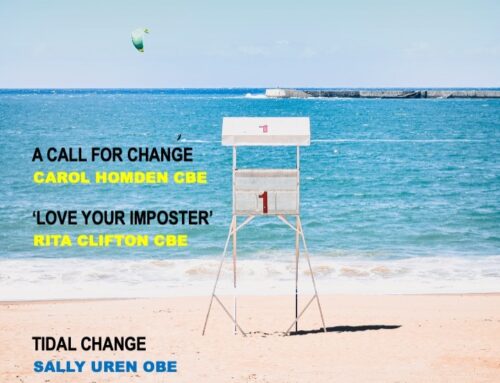Leadership out of the Darkness

When Amy lost her mother to COVID, a volunteer from her local community centre checked on her and a housing charity negotiated with her landlord to secure her tenancy. When Sara lost her job and could no longer afford the dog food, it was the animal rescue centre that helped out. When Samira and the kids ate their last tin of tuna, our local food bank provided her with food for the week. Thousands of lifelines have been thrown to my Hackney neighbours, coordinated by the local church.
In the UK there are over 180,000 registered charities. Probably twice that number if we count the thousands of unregistered organisations and community groups. Choirs, neighbourhood watchers, food distribution centres, and groups advocating for the sick and down trodden. There are almost a million paid staff in this sector, and an incredible force of 20 million regular volunteers.
Over 90% of UK citizens use charity services at least once a month. That’s people like you and me, and includes visits to National Trust properties and charity shops. Many beneficiaries are the ‘other half’, people in dire straits, living below the poverty line, or deeply disadvantaged by our social system. But enormous numbers of ordinary people use charities every day, sometimes only while we are in a bad patch, or it can be a lifetime relationship.
All of us will at some point in our lives, seek solace and support from the amazing array of charities to see us through an array of difficult events from bereavement to memory loss – in fact there are charities for every cause, every life crisis, every justice issue. Tommy’s cares for premature babies, ThinkForward helps youngsters leaving school, FareShare redistributes food, Re-engage helps isolated older folk. Charities are the lifeblood of our communities supporting people from the cradle to the grave. Our country without them would be unimaginable.
Never have charities been more needed. Homelessness, hunger and loneliness are escalating every week, and charities large and small have responded magnificently. Food banks, telephone support lines and outreach workers have mobilised to deal with the COVID-19 fall out. Many have had to adapt their systems and technology overnight, as demand for their services has risen astronomically. While the nation rightly applauds our public services (our NHS and police heroes), charity workers go un-noticed and un-clapped. Everywhere in the country, in every town, village and community, charity workers and volunteers are also saving lives.
While these local heroes labour selflessly, we should also acknowledge their limitations and the fragility of the charities they work for. Like so many businesses, they will find it harder than ever to return to pre-COVID strength. Sickness, mental health, stress and organisation unpreparedness have hit them hard and many are on their knees. And as the recession takes hold, we are starting to see beloved charities let staff go and close their doors for good. Inevitably black and minority ethnic groups are disproportionately affected.
At Clore Social Leadership, the organisation I work for, we expected that this would be our fate too. We readied ourselves for a hard year and have been pleasantly surprised to see a rise in demand for leadership development. Leaders in our sector are recognising that the world will be a different place, and the old methods and systems may no longer work. They tell us also that they are burnt out, need to build resilience, crave new networks and require a new skill set. We are needed like never before.
This is a sector that has lagged behind in terms of its skills; professional development is rarely a priority for charity workers who see it as unaffordable or an indulgence. The majority of social leaders receive NO professional development, yet are on the frontline of supporting our communities.
Our research shows that at least leaders of the larger charities recognise the need to develop their people, but they cannot find budgets or allow their staff the time off. Social leaders themselves do not earn enough to pay for training, and do not have the incentives of career structure and pay rewards to justify the investment. Our research with Pro Bono Economics shows that investment in leadership could result in a 23% increase in organisational productivity and performance. The leverage could be powerful indeed. Relatively small investments in training and skills can have a catalytic impact, resulting in stronger organisations, more beneficiaries and better services. Yet collectively, government and the sector have been slow to take action.
So what is to be done? In the short term, we at Clore Social are building an online leadership academy. Our traditional, more intensive programmes will continue to provide a gold standard in leadership development. But we know that scale and reach are urgently needed. We must build a menu of affordable and relevant courses, promoting them widely to the one million community leaders, providing them with the basic leadership and management skills to do their jobs better. We are also building a peer-learning community, encouraging leaders to learn through engaging and sharing experiences of building communities and working together for positive social change.
But we cannot do this alone. Government must support this effort and see it as an investment in building the infrastructure that supports our communities and builds resilience. And the corporate sector with its experience of professional development and business leadership can be a powerful and helpful ally.
There has never been a more important time to support and develop community leaders who must lead us out of the darkness. And we know that there can be no levelling up or building back better if we do not.
Shaks Ghosh CBE
CEO, Clore Social Leadership
http://www.cloresocialleadership.org.uk


Leadership out of the Darkness

When Amy lost her mother to COVID, a volunteer from her local community centre checked on her and a housing charity negotiated with her landlord to secure her tenancy. When Sara lost her job and could no longer afford the dog food, it was the animal rescue centre that helped out. When Samira and the kids ate their last tin of tuna, our local food bank provided her with food for the week. Thousands of lifelines have been thrown to my Hackney neighbours, coordinated by the local church.
In the UK there are over 180,000 registered charities. Probably twice that number if we count the thousands of unregistered organisations and community groups. Choirs, neighbourhood watchers, food distribution centres, and groups advocating for the sick and down trodden. There are almost a million paid staff in this sector, and an incredible force of 20 million regular volunteers.
Over 90% of UK citizens use charity services at least once a month. That’s people like you and me, and includes visits to National Trust properties and charity shops. Many beneficiaries are the ‘other half’, people in dire straits, living below the poverty line, or deeply disadvantaged by our social system. But enormous numbers of ordinary people use charities every day, sometimes only while we are in a bad patch, or it can be a lifetime relationship.
All of us will at some point in our lives, seek solace and support from the amazing array of charities to see us through an array of difficult events from bereavement to memory loss – in fact there are charities for every cause, every life crisis, every justice issue. Tommy’s cares for premature babies, ThinkForward helps youngsters leaving school, FareShare redistributes food, Re-engage helps isolated older folk. Charities are the lifeblood of our communities supporting people from the cradle to the grave. Our country without them would be unimaginable.
Never have charities been more needed. Homelessness, hunger and loneliness are escalating every week, and charities large and small have responded magnificently. Food banks, telephone support lines and outreach workers have mobilised to deal with the COVID-19 fall out. Many have had to adapt their systems and technology overnight, as demand for their services has risen astronomically. While the nation rightly applauds our public services (our NHS and police heroes), charity workers go un-noticed and un-clapped. Everywhere in the country, in every town, village and community, charity workers and volunteers are also saving lives.
While these local heroes labour selflessly, we should also acknowledge their limitations and the fragility of the charities they work for. Like so many businesses, they will find it harder than ever to return to pre-COVID strength. Sickness, mental health, stress and organisation unpreparedness have hit them hard and many are on their knees. And as the recession takes hold, we are starting to see beloved charities let staff go and close their doors for good. Inevitably black and minority ethnic groups are disproportionately affected.
At Clore Social Leadership, the organisation I work for, we expected that this would be our fate too. We readied ourselves for a hard year and have been pleasantly surprised to see a rise in demand for leadership development. Leaders in our sector are recognising that the world will be a different place, and the old methods and systems may no longer work. They tell us also that they are burnt out, need to build resilience, crave new networks and require a new skill set. We are needed like never before.
This is a sector that has lagged behind in terms of its skills; professional development is rarely a priority for charity workers who see it as unaffordable or an indulgence. The majority of social leaders receive NO professional development, yet are on the frontline of supporting our communities.
Our research shows that at least leaders of the larger charities recognise the need to develop their people, but they cannot find budgets or allow their staff the time off. Social leaders themselves do not earn enough to pay for training, and do not have the incentives of career structure and pay rewards to justify the investment. Our research with Pro Bono Economics shows that investment in leadership could result in a 23% increase in organisational productivity and performance. The leverage could be powerful indeed. Relatively small investments in training and skills can have a catalytic impact, resulting in stronger organisations, more beneficiaries and better services. Yet collectively, government and the sector have been slow to take action.
So what is to be done? In the short term, we at Clore Social are building an online leadership academy. Our traditional, more intensive programmes will continue to provide a gold standard in leadership development. But we know that scale and reach are urgently needed. We must build a menu of affordable and relevant courses, promoting them widely to the one million community leaders, providing them with the basic leadership and management skills to do their jobs better. We are also building a peer-learning community, encouraging leaders to learn through engaging and sharing experiences of building communities and working together for positive social change.
But we cannot do this alone. Government must support this effort and see it as an investment in building the infrastructure that supports our communities and builds resilience. And the corporate sector with its experience of professional development and business leadership can be a powerful and helpful ally.
There has never been a more important time to support and develop community leaders who must lead us out of the darkness. And we know that there can be no levelling up or building back better if we do not.
Shaks Ghosh CBE
CEO, Clore Social Leadership
http://www.cloresocialleadership.org.uk





